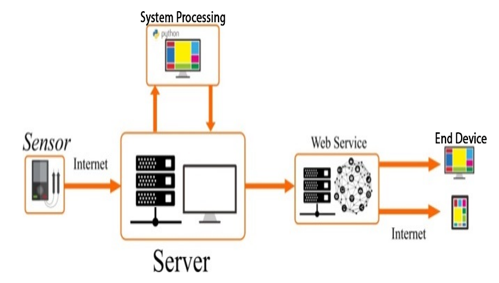Online Fuzzy Logic Prediction of Electrical Load Based on Real-Time Measurements During the Covid-19 Pandemic
Keywords:
forecasting, fuzzy logic, online, electrical load, IoT, electricityAbstract
As technologies advance and the population grows, electrical energy became one of the necessities for many peoples. Because the availability of electrical energy is limited, it requires various ways to be used efficiently. Electrical load monitoring usage in Indonesia still require an electrical officer to come to an electric panel location to record electrical usage. During the COVID-19 pandemic, it is not feasible to locally visit an electric panel because of the many restrictions. Remote monitoring using Internet of Things (IoT) can be used to address the problem. Going further, by knowing the electrical load usage, prediction can be done using fuzzy logic as a way to understand how to use electricity efficiently. Thus, a fuzzy logic load forecasting system IoT is developed in this research. Fuzzy variables used in this system are time of day, days of the week, measured loads, and forecasted loads. The research produced a system that predicts electrical load with one hour of accuracy based on the previous week's data. The average prediction error rate of the system is 9.48%. The implemented system is available on a web server and can be accessed via a web browser, either via a computer or cellphone. The system allows users to monitor and predict electrical load usage regardless of time and place.
Downloads
References
Despa, D., Hakim, L., Syafruddin, M., 2014. Metode Regresi Linier untuk Prediksi Kebutuhan Energi Listrik Jangka Panjang (Studi Kasus Provinsi Lampung. Lampung: JITET vol. 2 no. 2 2014.
Despa, D., Kurniawan, A., Komarudin, M., & Nama, G.F., 2015. Smart Monitoring of Electrical Quantities Based on Single Board Computer BCM238. 2nd International Conference on Information Technology, Computer, and Electrical Engineering (ICITACEE).
Despa, D., Nama, G.F., Komarudin, M. & Zontche, M., 2016. Multi-Area Smart Monitoring of Electrical Quantities on Single Board Computer BCM2835. International conference EECCIS, Malang, Indonesia.
Despa, D., Nama, G.F., Muhammad, M.A., & Anwar, K., 2017. The Implementation of Internet of Things (IoT) Technology in Real Time Monitoring of Electrical Quantities. IOP Conference Series: Materials Science and Engineering Vol 335 No 1.
Despa, D., Nama, G.F. 2018. An Enhanced K-Means Clustering Algorithm for Pattern Discovery in Big Data Analysis of 3-Phase Electrical Quantities. International Journal of Engineering &Technology (IJET) Vol 7 Issue 4.36.
Despa, D., Nama, G.F., Setiawan, Fx., A., & Delano, J., 2019. Artificial Neural Network Applications Use Measurements of Electrical Quantities to Estimate Electric Power. Journal of Physics: Conference Series Vol 1376 Issue 1.
Ali, A.T., Elisa, B.M., Shamseldin, Z.M., 2016. Short Term Load Forecasting Using Fuzzy Logic. Sudan: IJAETMAS
Dewi, S.K., 2010. Neuro-Fuzzy: Integrasi Sistem Fuzzy dan Jaringan Syaraf. Yogyakarta: Graha Ilmu
Widodo, T.S, 2005. Sistem Neuro Fuzzy untuk Pengolahan Informasi, Pemodelan, dan Kendali. Yogyakarta: Graha Ilmu.
Singh, S.K., 2009. Database System Concepts, Design, and Application. New Delhi: Dorling Kindersley.
Mamdani, E.; Assilian, S. An experiment in linguistic synthesis with a fuzzy logic controller. Int. J. Man-Mach. Stud. 1975, 7, 1–13.
Takagi, T.; Sugeno, M. Fuzzy identification of systems and its applications to modeling and control. IEEE Trans. Syst. Man.Cybern. 1985, SMC-15, 116–132.
Jang, J.S. ANFIS: Adaptive-network-based fuzzy inference system. IEEE Trans. Syst. Man, Cybern. 1993, 23, 665–685.
Tak, N. Type-1 possibilistic fuzzy forecasting functions. J. Comput. Appl. Math. 2020, 370, 112653.
Singh, P. High-order fuzzy-neuro-entropy integration-based expert system for time series forecasting. Neural Comput. Appl. 2017, 28, 3851–3868.
Cagcag Yolcu, O.; Alpaslan, F. Prediction of TAIEX based on hybrid fuzzy time series model with single optimization process.Appl. Soft Comput. 2018, 66, 18–33.
Cai, Q.; Zhang, D.; Zheng, W.; Leung, S.C. A new fuzzy time series forecasting model combined with ant colony optimization and auto-regression. Knowl.-Based Syst. 2015, 74, 61–68.
Egrioglu, E.; Aladag, C.H.; Yolcu, U. Fuzzy time series forecasting with a novel hybrid approach combining fuzzy c-means and neural networks. Expert Syst. Appl. 2013, 40, 854–857.
Teoh, H.J.; Cheng, C.H.; Chu, H.H.; Chen, J.S. Fuzzy time series model based on probabilistic approach and rough set rule induction for empirical research in stock markets. Data Knowl. Eng. 2008, 67, 103–117.
E.H. Mamdani and S. Assilian. An experiment in linguistic synthesis with a fuzzy logic controller. International Journal of Man-Machine Studies, 7(1):1-13. 1975

Downloads
Published
How to Cite
Issue
Section
License

This work is licensed under a Creative Commons Attribution-ShareAlike 4.0 International License.
All papers should be submitted electronically. All submitted manuscripts must be original work that is not under submission at another journal or under consideration for publication in another form, such as a monograph or chapter of a book. Authors of submitted papers are obligated not to submit their paper for publication elsewhere until an editorial decision is rendered on their submission. Further, authors of accepted papers are prohibited from publishing the results in other publications that appear before the paper is published in the Journal unless they receive approval for doing so from the Editor-In-Chief.
IJISAE open access articles are licensed under a Creative Commons Attribution-ShareAlike 4.0 International License. This license lets the audience to give appropriate credit, provide a link to the license, and indicate if changes were made and if they remix, transform, or build upon the material, they must distribute contributions under the same license as the original.





